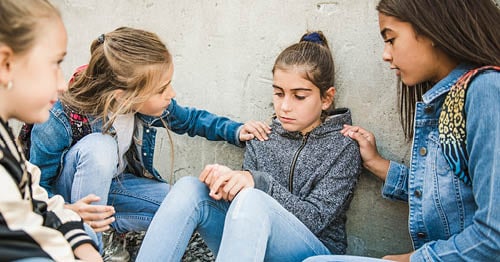5 Ways to Teach Students About Juneteenth
by Connections Academy
by Valerie Kirk
8 min to readMany parents worry that their child may be bullied. With 28% of middle school and 19% of high school students reporting that they have been bullied, the effects of bullying can be devastating. Students who have been bullied suffer academically, and they are more likely to skip school or drop out of school entirely. They also experience higher rates of depression, anxiety, and loneliness.
Parents have a natural instinct to want to protect their children from experiencing any of that. But what if you discover that your child has been bullying others?
It’s something that no parent wants to hear. But for every child that is being bullied, there is a child that is doing the bullying. Just like being bullied affects a person’s mental health, being a bully also has negative impacts that can follow a child into adulthood, so addressing the behavior is important to avoid long-term problems.
While your initial reaction may be one of shame, denial, or anger–or all three–take a deep breath and approach parenting a bully from a place of calm to first understand why they are bullying. Then working together, you can develop strategies to help your child change their aggressive behavior.
When you get the news that your child has been bullying others, it’s important to understand what bullying is–and what it isn’t. Bullying goes beyond a single, isolated incident such as an argument with a classmate. It involves repeated negative behavior over a period of time.
There are 3 elements of bullying:
Bullying can happen anywhere–at school, in your neighborhood, and even on your child’s sports teams or extracurricular clubs. More than half of U.S. teenagers report being bullied online.

The perception that bullies are just “bad kids” is just not true. Even well-behaved kids who have never been in trouble before can engage in bullying behaviors. There are many reasons that could drive a child to bully others, such as:
Just like when kids are victims of bullying, kids who bully others themselves can experience long-term mental health issues unless the negative behavior is addressed. They may have trouble making friends or forming healthy relationships with significant others. They are at higher risk of abusing alcohol, tobacco, and other drugs.
Addressing the underlying issues as to why kids bully is critical to avoiding long-term consequences. Families can help their children learn empathy by modeling caring and compassionate behavior towards others at home. They can also teach kids anger management strategies, healthy coping skills, how to resolve conflicts in a positive way, and how to regulate their emotions to help them grow into well-adjusted and happier adults. Seeking the support of a mental health professional now could also avoid issues later in life.

It’s important to stay vigilant and watch for changes in your child’s behavior that could indicate they are bullying others. Signs include:
When you first learn your child is bullying others, opening the lines of communication quickly is critical. Talk to your child calmly about what you have learned about their behavior. Give them the opportunity to explain what is going on from their point of view or what might be driving their behavior.
While it is critical to listen to their side, it’s also important for you to let them know that you have zero tolerance for bullying behaviors in any situation. To drive that point home, ensure your house is bully free, and that you set positive examples on how to treat others. Model kindness and empathy to help your child learn those behaviors. Understanding why your child is being a bully will guide your next steps in getting them to stop acting aggressively towards others.
Here are some tips for helping a child who is bullying others at every academic stage stop aggressive behaviors.
It’s hard for both the kids doing the bullying and the kids being bullied to express themselves about what is going on at this age, which is why it’s important to play an active role in your child’s life. Set aside time to talk to them every day about the interactions they have with other kids. Ask questions about what they say to other kids or what they do with them during downtime.
If you learn your child is bullying others, it’s critical to address their behavior and not brush it off as kids just being kids. Steps you can take include:
Being a bully at this stage could affect their ability to make friends, which could have lasting impacts on their social and emotional well-being. Equipping them with the tools they need to stop acting aggressively now may lead to more positive interactions as they go through school.
Helping your child in late elementary school overcome aggressive behaviors will help them significantly when they move on to middle school. Steps you can take include:
It’s probably no surprise that more kids report being bullied in middle school than in any other grade. Kids at this age are trying to find their way and they want to fit in, which could cause them to act out of character and bully others.
It’s critical to try to keep the lines of communication open with your middle schooler, even as they try to push you away. If you learn your middle school child is bullying others, talk to them about why they are doing it. Address any issues related to their insecurities. If they are bullying others to fit in, have candid conversations with them about the impacts of following the crowd, especially a crowd that engages in bad behavior. If you discover that your child is bullying someone that has bullied them, let them know that bullying behavior is not the answer to dealing with bullies. Encourage them to talk to an adult at the school about what is happening.
Other ways you can guide your middle schooler to stop bullying include:

While incidents of bullying drop slightly in high school, it is still a significant problem. The consequences of their behavior could have a greater impact. They could experience suspension or be excluded from participating in teams and clubs based on their school’s policies.
If you learn that your high schooler is bullying others, talk to them about why they are doing it, and let that guide your response. If they are engaging in cyberbullying, let them know you are monitoring their online behavior. Other ways to help stop your high school student’s bullying behavior include:
Children who bully as a coping mechanism become adults who continue using that behavior. With the right support and guidance, kids can move away from aggressive tendencies. Helping them build healthy conflict resolution skills and learning emotional regulation now can help ensure they have healthier relationships and better overall well-being later. Your child will likely benefit when you get involved and help them make positive changes.
by Connections Academy
by Cassandra Polzin
by Dan Belenky
